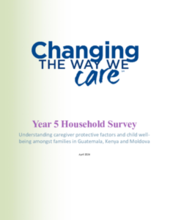The Changing the Way We Care (CTWWC) initiative conducted its Year 5 Household Survey as part of its commitment to building evidence around outcomes for children and families in the context of care reform. The second round of this survey in Kenya and Guatemala, and first round in Moldova, aimed to understand the impact of CTWWC interventions on children and families transitioning from residential care to family-based alternatives or receiving support to prevent separation.
The survey sought to address several key research questions, including caregivers' perceptions of family strengthening support, the prevalence of protective factors amongst caregivers and of well-being in children's lives, as well as the correlation between protective factors and well-being. Importantly, the survey aimed to directly capture the perspectives of children and caregivers to ensure their experiences shape care reform efforts.
The findings highlight CTWWC's successes and challenges. In Guatemala, 18-month post-case closure, results show high caregiver satisfaction and long-term resilience, with families feeling well-prepared for independence. These findings will be used to inform ongoing case management efforts in the country. In Kenya, despite positive service feedback and high caregiver protective factors, economic challenges and education costs remain issues, with future surveys needed to assess recent interventions. Moldova's first round survey provided insights into reintegration and foster care placements, especially for children with disabilities.
While caregivers appreciated home visits, cash assistance, and service referrals, concerns about community support, healthcare, and school inclusion persist. CTWWC plans to enhance collaboration with civil society for better inclusivity. Through this study, CTWWC continues its mission of promoting safe and nurturing family care for vulnerable children across diverse contexts, contributing to the global movement for care reform.

